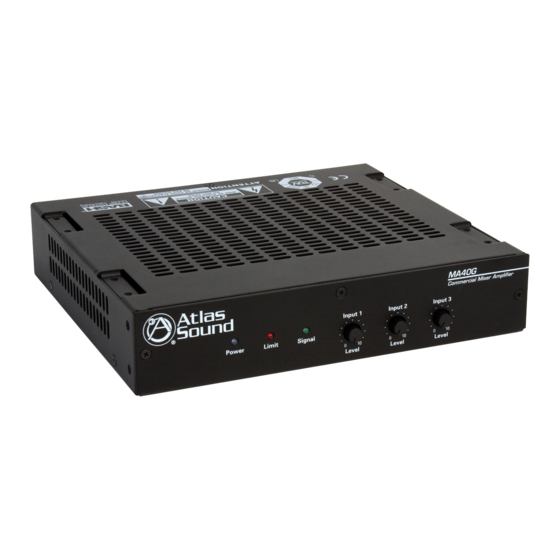Atlas MA60G Owner's Manual - Page 9
Browse online or download pdf Owner's Manual for Amplifier Atlas MA60G. Atlas MA60G 12 pages. Mixer amplifiers

Owner's Manual
Measuring a Speaker System's Impedance
Note: It is important to only use an Audio Impedance Meter and not a conventional Volt/Ohm meter.
A true audio frequency impedance meter is essential for reliable installation of background music and paging systems in residences,
office buildings and public areas. Avoid costly service calls and amplifier damage by verifying actual speaker system impedance prior
to operation. Unlike conventional volt/ohm meters, which measure DC resistance, an Audio Impedance Meter unit utilizes an internal
frequency oscillator to measure true impedance. It may also be utilized with 70.7V and 100V speaker line transformers, L-pads and
matching Impedance volume controls. There are several Audio Impedance meters on the market, if you need to buy one we suggest
going to MCM Electronics, Parts Express or search the internet for "Audio Impedance Meter".
Measuring 70.7V or 100V Distributed Speaker Systems
Large distributed systems typically utilize 70.7V (North America) or100V (Europe) type system to greatly ease the connection of
multiple speakers and facilitate long cable runs. Shown below are speakers connected in parallel with wattage ratings to calculate
the overall load of the system. Connecting an Audio Impedance Meter to a speaker arrangement such as this will provide the overall
impedance of the system.
Using the following formula you can calculate the load impedance from the speaker selected wattage. The accumulative wattage of
the speaker system must not exceed the maximum wattage output rating of the amplifier or damage may occur. In this example the
measurement for a 70.7V design with three speakers of 15W each, the system impedance would measure close to 111Ω. Formula
70.7V x 70.7V = 4998, 4998 / 45W = 111Ω. The amplifier power requirements would be at least 60W for the system to operate
properly. Note: It is always recommended to use a larger amp than needed with power headroom of at least 25%. Calculate the load
impedance and compare it to the meter's audio impedance reading. Note: They will never be the same due to the additional wire
impedance, but if they are within 10% of the maximum impedance rating or if the impedance is higher than the maximum rating,
proceed connecting the load to the amplifier. If they are not recheck your speaker taps or check for shorts.
MA40G / MA60G
Mixer Amplifier
1601 Jack McKay Blvd. • Ennis, Texas 75119 U.S.A.
Telephone: 800.876.3333 • Fax: 800.765.3435
– 9 –
Specifications are subject to change without notice.
AtlasSound.com
